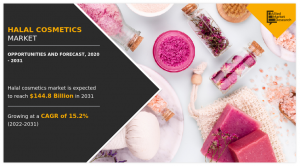Halal Cosmetics Market by Product Type, by Application, by Distribution Channel: Global Opportunity Analysis and Industry Forecast, 2020-2031
PORTLAND, OREGON, UNITED STATES, July 19, 2022 /EINPresswire.com/ -- According to a new report published by Allied Market Research, titled, “Halal Cosmetics Market 2020-2031," The halal cosmetics market size was valued at $30,685.40 million in 2020, and is estimated to reach $144,816.10 million by 2031, growing at a CAGR of 15.2% from 2022 to 2031. The report offers an extensive analysis of key growth strategies, drivers, opportunities, key segment, Porter's Five Forces analysis, and competitive landscape.
Halal cosmetics have a substantial application among Muslim consumers owing to the increasing demand for personal grooming and trending beauty products that adhere to religious loyalties among Muslims. In the LAMEA region, the Middle East accounts for the highest market share owing to the presence of the Muslim majority countries that strictly obey the religious commitments in their halal cosmetic products. However, Asia-Pacific is expected to exhibit the fastest growth attributed to the growing Muslim population in Muslim majority countries such as Malaysia, Singapore, and Indonesia, along with an increasing focus on personal and beauty care.
The global halal cosmetics market is driven by rise in Muslim population globally and booming halal market, which has now extended its product base to meet the growing personal & beauty care needs of Muslim population. Halal certification enables Muslim population to identify the genuine products, thereby obeying the virtues of their religion, thereby fueling the growth of the global halal cosmetics market.
Request Sample Report: https://www.alliedmarketresearch.com/request-sample/2138
According to the global halal cosmetics market analysis, the market is divided by product type, application, distribution channel, and geographical division. By product type, it comprises personal care products, color cosmetics, and fragrances. By application, it includes hair care, skin care, face care, and beauty care. Based on the distribution channel, the market is segmented into online and offline. By geography, it includes North America, Europe, Asia-Pacific, and LAMEA markets. Further, the report also covers the strategies adopted by key market players in order to sustain competitive environment and increase their market share.
Among the product type, fragrance segment is expected to have the highest CAGR during the halal cosmetics market forecast period, followed by color cosmetics. The color cosmetics segment is expected to account for $48,801.5 million in 2031, registering a CAGR of 15.5%. Halal color cosmetics have widespread adoption among the Muslim women population, especially in the youth. Increase in interest of the young Muslim population toward make-up trends that adhere to the religious loyalties has fueled the demand for global color cosmetic products.
Based on distribution channel, offline sales channel held the major halal cosmetics market share. Offline distribution channels include standalone stores, retail stores, supermarkets, and others wherein the products are displayed for consumers to have a first-hand look at the products that enable them to check the authenticity of the products.
The demand for halal cosmetic products in the overall halal cosmetics industry is expected to be driven by increase in purchasing power of the growing Muslim population and significant desire among young Muslim women to associate their interest in fashion and makeup with Islamic religious loyalties. These factors also provide lucrative opportunities to the multinational cosmetic companies to enter the halal cosmetics market. Countries such as Saudi Arabia, Iran, UAE, Malaysia, and Indonesia offer potential growth opportunities for halal color cosmetics products owing to the factors such as increase in young population, high disposable income, and rise in interest in fashion and makeup trends.
For Purchase Inquiry: https://www.alliedmarketresearch.com/purchase-enquiry/2138
The report includes comprehensive analysis of the key players in the operating in the market such as Amara Cosmetics, Iba Halal Care, Halal Cosmetics Company, Clara International, Inika, Wardah Cosmetics, PHB Ethical Beauty, Sampure Minerals, One Pure, Mena Cosmetics, and SaafSkinCare.
Key Benefits For Stakeholders:
○ This report provides a quantitative analysis of the market segments, current trends, estimations, and dynamics of the halal cosmetics market analysis from 2020 to 2031 to identify the prevailing halal cosmetics market opportunities.
○ The market research is offered along with information related to key drivers, restraints, and opportunities.
○ Porter's five forces analysis highlights the potency of buyers and suppliers to enable stakeholders make profit-oriented business decisions and strengthen their supplier-buyer network.
○ In-depth analysis of the halal cosmetics market segmentation assists to determine the prevailing halal cosmetics market opportunity.
○ Major countries in each region are mapped according to their revenue contribution to the global market.
○ Market player positioning facilitates benchmarking and provides a clear understanding of the present position of the market players.
Related Reports:
○ Cosmetic Serum Market Will Show An Increase Of By 2027, Report
○ Nutracosmetic Market Revenue to Register Robust Growth Rate During 2027
David Correa
Allied Analytics LLP
800-792-5285
email us here
Visit us on social media:
Facebook
Twitter
LinkedIn


